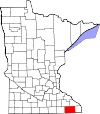Fillmore County Criminal Court hears all criminal cases in Fillmore County. Below you will find specific information about criminal cases and how they are handled in Fillmore County.
What if I can’t afford an attorney?
The 6th Amendment guarantees you the right to an attorney whether or not you can afford one. If you cannot afford one, a public defender will be appointed by the court to represent you.
Mandatory Appearances in Fillmore County Criminal Court
At a mandatory or required court appearance in Fillmore County, the defendant must appear before the court. In the event of a “Failure to Appear” the judge may issue a warrant for the arrest of the defendant. Note: not all criminal hearings are mandatory, in a non-mandatory hearing an attorney may appear on your behalf without you being in court.

Fillmore County Criminal Court
Burden of Proof Requirement
In a criminal case in the United States, the burden of proof always requires the prosecutor to prove beyond a reasonable doubt that the defendant is guilty. This is a high threshold that must be met by the prosecution when presenting evidence in a case. If the prosecution fails in it’s burden to prove guilt beyond a reasonable doubt the judge must find the defendant not guilty. In a jury trial, the judge will inform the jury what this burden is and their obligation to find the defendant not guilty if they feel the prosecution did prove the defendant’s guilt beyond a reasonable doubt.
Appealing a Criminal Conviciton
A defendant may appeal a criminal conviction to an appellate court. In an appeal, the actual trial is not redone, but the appellate court hears arguments that the criminal case was not handled in a legal manner at the original criminal court. The appellate court can either uphold the conviction, or determine that errors were made and may request a retrial, a resentencing of the defendant or that the charges be dismissed.
Where can I get help for my Fillmore County criminal case?
The 6th amendment of the United States Constitution provides a criminal defendant with the right to an attorney. As read in the miranda rights, this means that if a defendant cannot afford to hire a private attorney a legal attorney will be appointed to the defendant to represent him at no cost to the defendant. This is often a public defender. In addition, the court clerk for Fillmore County will also be able to provide general information about a specific criminal case. The clerk can only provide information and is not an attorney so they cannot provide legal advice, only a licensed attorney can provide legal advice about what the best options for are for your particular case.
If guilty, who sentences the defendant?
If the defendant is found guilty after the trial, the defendent will be sentenced. In some cases, this can occur at the same hearing the defendant is found guilty in court, in other cases a separate hearing will be required. Often the prosecution will request a particular sentence for the defendant and the judge will determine whether to enforce this sentence or impose a different sentence for the defendant.
The Right to Trial by Jury
The Sixth Amendment of the United States Constitution guarantees the right to a trial by a jury. This is applicable for when the crime can carry a sentence of 6 months in jail OR a $500 fine, these are known as “Serious Crimes”. The defendant can also waive their right to a speedy and public trial.
Can I request a Plea Agreement?
In Fillmore County you may be able to enter into a plea agreement depending upon the severity of the charges. It is also dependant upon the prosecution willing to accept a plea agreement. You can ask your attorney to attempt to negotiate a plea agreement with the prosecution to avoid having a jury trial along with the potential for a more serious sentence. Approximately 9 out of 10 criminal cases usually end in a plea agreement.
What happens in Fillmore County at an arraignment?
In Fillmore County the defendant is brought into court and informed by the judge of the charges that have been filed against them along with informing them of their rights. At this time, the defendant can plead guilty, not guilty or no contest. If the defendant pleads guilty or no contest, there will be no trial and the defendant may be sentenced immediately or at a later date. If the defendant pleads not guilty a trial date is set.
What is Jury Deliberation?
After both the prosecution and defense have presented their cases, the judge in the case will provide instructions to the jury about what they must decide. The jury will be dismissed to the jury room where they will deliberate about the guilt or innocence of the defendant. After reaching a unaminous decision, they return their decision to the court where it is read aloud in the courtroom. If the jury is unable to reach a unaminous decision, the jury is deadlocked, also known as a hung jury, in which a mistrial will be declared.
Who is the prosecutor for Fillmore County?
Depending upon the case, the prosecutor for Fillmore County criminal cases will either be a representative of Fillmore County or a representative from Minnesota. After reviewing evidence it is the prosecutor’s decision whether to file charges or drop a case. Most prosecutors have the ability to negotiate plea bargains, and determine how the case will be prosecuted.
Fillmore County Criminal Court hearings
Criminal hearings in Fillmore County will take place at the Fillmore County Criminal Courts. Please see here for a list of the Fillmore County Criminal Court Locations.
Fillmore County Criminal Court Location
-
Fillmore County District Court
Address: 101 Fillmore Street, PO Box 436, Preston, MN 55965
Phone: 507-765-3356 Fax: 507-765-4571